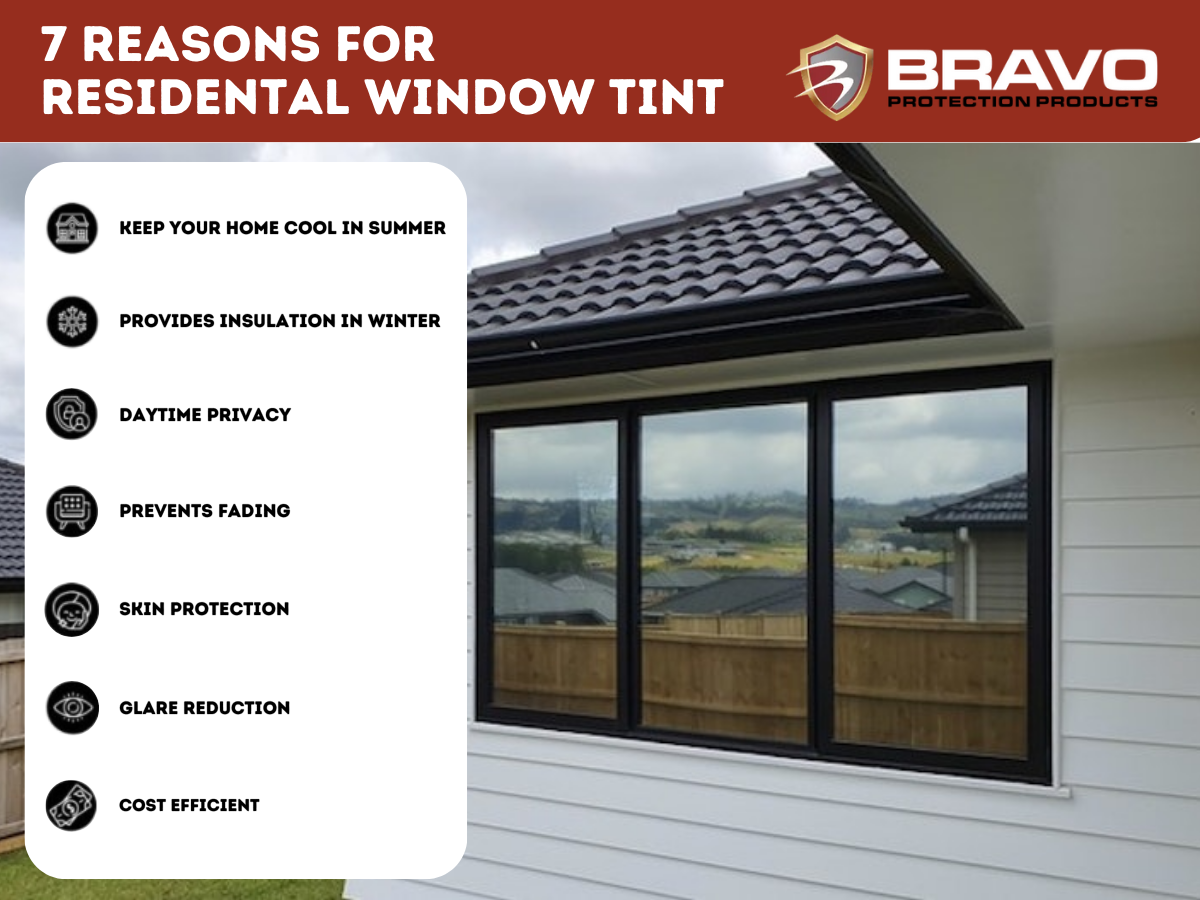Inexpensive Residential Window Tint Options for Every Spending plan
Exactly How Residential Window Tinting Enhances Your Home's Energy Effectiveness
Residential home window tinting presents an engaging option for homeowners looking for to boost power performance within their living spaces. By using specialized movies to home windows, it properly lowers warm transfer, thereby stabilizing indoor temperatures and minimizing the demand for excessive home heating or cooling.
Comprehending Window Tinting
Recognizing home window tinting is important for property owners seeking to enhance both comfort and energy performance in their space. Residential Window Tint. Window tinting entails the application of a thin movie to the interior or outside surface of glass windows. This movie can significantly regulate the quantity of sunlight and heat that goes into a home, hence affecting interior environment conditions
There are numerous kinds of window tinting films offered, each with unique residential properties. The performance of home window tinting is commonly determined by its Visible Light Transmission (VLT) percent, which shows how much light can pass via the film.
Benefits of Energy Performance
Window tinting not just improves looks but also plays a significant role in improving energy effectiveness within household spaces. By lowering heat transfer through home windows, colored movies produce a much more secure indoor climate, which can cause significant reductions in power usage for home heating and cooling. This energy efficiency converts into reduced utility expenses, providing home owners with substantial lasting savings.

Additionally, window tinting boosts the comfort of living spaces. By decreasing glare and obstructing dangerous UV rays, tinted windows produce a more positive environment, which can lead to improved health for owners. The protection against UV rays likewise helps maintain furnishings and flooring from fading, adding to the long life of household things.
How Tinting Functions
Tinting films run via a mix of innovative products and modern technologies created to regulate the quantity of solar power getting in a home. Mainly made up of polyester, these films typically include ceramic or metal bits that take in and reflect warmth. This dual capability enables them to substantially lower the infiltration of ultraviolet (UV) rays and infrared radiation while permitting noticeable light to travel through.
The performance of window tinting is determined by its solar heat gain coefficient (SHGC), which indicates just how much solar power is sent via the window. Reduced SHGC worths are better as they denote higher heat rejection. Additionally, window colors can feature a variety of tones, enabling property owners to tailor their aesthetic preferences while boosting energy effectiveness.
Moreover, these films function as an obstacle, protecting against heat loss throughout colder months by mirroring interior heat back right into the space. This thermal insulation impact complements the air conditioning advantages gained during warmer months, contributing to a balanced interior climate year-round. By managing solar energy properly, domestic home window tinting not just improves comfort but also plays an essential duty in reducing power intake and decreasing energy expenses.
Selecting the Right Tint

There are various kinds of window films readily available, consisting of colored, metalized, and ceramic. Ceramic films supply excellent warmth control without compromising presence and are highly long lasting, making them a preferred selection.
Noticeable light transmission (VLT) is website link an additional essential variable, as it suggests the amount of natural light that can pass via the colored glass. Homeowners should select a color with a VLT that complements their lights preferences while still offering ample glow decrease.
Additionally, examining the solar warm gain coefficient (SHGC) can assist establish how well a tint can block heat from sunlight. A reduced SHGC shows better warm control, ultimately boosting energy effectiveness.
Setup and Upkeep Tips
Appropriate setup and maintenance are vital elements in maximizing the benefits of residential home window tinting. Specialists additionally make use of specialized techniques and devices, which can improve the resilience and effectiveness of the tint.
Adhering to setup, maintenance is necessary to lengthen the life of the window film. It is advised to wait at least thirty day prior to cleaning the colored home windows to permit the adhesive to treat totally. When cleansing, use a soft fabric and a view publisher site mild, ammonia-free cleaner to prevent damaging the movie. Avoid rough products that might scratch the surface.
Furthermore, regular inspections are advantageous. Look for any type of peeling or bubbling, which could show incorrect setup or put on gradually - Residential Window Tint. Dealing with these problems without delay can stop additional damages and keep power effectiveness. By adhering to these installation and maintenance suggestions, homeowners can guarantee their home window tinting continues to provide considerable energy savings and comfort for many years to find.
Conclusion
To conclude, residential window tinting acts as an efficient service for enhancing power effectiveness within homes. By decreasing warm transfer and blocking harmful UV rays, window movies add to reduce energy intake and enhanced indoor comfort. The selection of appropriate tinting products, in addition to correct installation and upkeep, better maximizes these benefits. Eventually, window tinting stands for a lasting investment that not just decreases utility bills however also advertises a find out here comfortable living environment throughout the year.
Window tinting includes the application of a slim movie to the inside or exterior surface area of glass home windows. By reducing warmth transfer via windows, tinted movies develop an extra steady interior environment, which can lead to considerable reductions in power intake for home heating and air conditioning.The effectiveness of home window tinting is gauged by its solar heat gain coefficient (SHGC), which indicates how much solar power is transferred through the window. By handling solar energy properly, domestic window tinting not only improves convenience yet additionally plays a crucial role in decreasing energy consumption and decreasing utility costs.
By minimizing warm transfer and blocking unsafe UV rays, home window movies add to lower power usage and boosted indoor convenience.